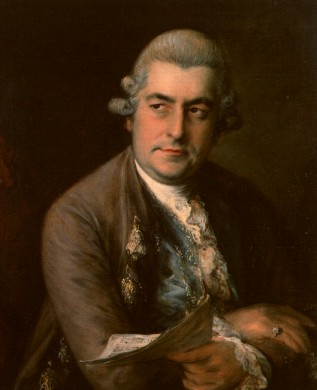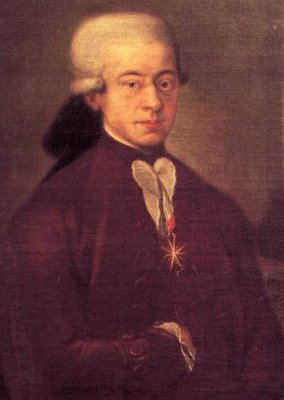Mozart's Counterpoint
In music history there are examples of great mentorship. One of the greatest -in my opinion- is that of Johann Sebastian Bach, who left entire volumes of his works that are devoted to the musical education of his family. There is also the teachings of Albrechstberger to the young Beethoven. However not even a great Bach-admirer like myself can overlook the particular case of Padre Giambattista Martini.
Giovanni Battista Martini (1706-1784) was a catholic priest considered to be one of the greatest counterpointists of the 18th century. "Padre Martini, the great counterpoint teacher of the eighteenth century, has left no really didactic work" , says Knud Jeppesen in his Counterpoint. Padre Martini wrote Essemplare o sia saggio fondamentale prattico di contrappunto fugato dealing with the fine art of fugue writing. This work is a complex one and it is not well-suited for the beginner. One must think of it as a "graduate-course" intended for the student who has completed studies on counterpoint and fugue, only then will one realize that Martini's unconventional teaching method marks the structure of the whole work, a method "neither divided into chapters and paragraphs...nor based on mere precepts" as Willi Reich would put it.

Johann Christian Bach
Another remarkable example of student-teacher relationship is given by Wolfgang Amadeus Mozart. This happened during Mozart's visit to London in 1764-1765. Johann Christian Bach was the most famous musician in England for twenty years, even more famous than his father, the great Johann Sebastian, ever was (old Bach was remembered as "the father of Johann Christian Bach"). J.C. Bach's works caused a lasting impression on young Mozart. Only a few years later, Wolfgang would travel to Bologna to study with Padre Martini. Then he became his direct student.
Wolfgang Amadeus Mozart made a very personal use of counterpoint. The Requiem K626, The unfinished C-Minor Mass, the final movement of the 'Jupiter' symphony are all evidence of it. However, the world of counterpoint is a complex and serious one. The rules one must observe and follow are sometimes too strict: they seem to limit the composer. I have met "accompished" musicians that are hostile towards counterpoint. Counterpoint is being replaced by harmony in most academic programs for this reason.

In October 9, 1770, Mozart presented his admission test for the Bologna Accademia dei Filarmonici, a very prestigious institute that remains to our days as one of the finest in the world. The test Mozart was set to solve was to compose a 4-part piece on an anonymous gregorian antiphon, Quaerite Primum Regnum Dei: "Seek ye first the kingdom of God". The results granted Mozart's admission to the Accademia, and even the aknowledgement of the faculty. Wolfgang's father, Leopold later wrote that his son took half an hour to complete what to most took three hours. W.A. Mozart was 14 years old.

Mozart's admission letter, followed by a copy of the piece he wrote.
The object of the test was not to evaluate Mozart's powers as a composer, but to see if he was able to sumbit himself to a more academic form of composition. The Quaerite of Mozart fails to achieve this completely, and for this reason his teacher, Padre Martini, wrote a different example to ilustrate his pupil on the correct solution to the excercise. This is where things get interesting.
One could speak volumes of the comparison between both excerises, like the omission of Mozart's second subject and the use of perfect cadences to confirm the tonality of F in the eleventh measure and the tonality of D at the end. However, I would like to emphasize the fact that Martini acknowledges the powers of his pupil. With only one exception, I haven't met a professor capable of doing this. Thesis and dissertation supervisors are no different. Most people will only criticize destructively thinking that they are constructively doing so.
Click here to download a copy of the score for Mozart's version. (KV86)
Click here to download a copy of Martini's version.
Comments Welcome!


6 Comments:
It's a pleasuer reading you, and now in English is greater. Thank you for sharing yoor knowledge and time with us, Cheers!
Thank you, Diana.
I haven't placed a link to your blog... shame on me...
Hola Antonio!
What a surprise to find this fabulous post en English. I didn't need the dictionary! ;) Do you remember my writing about Uncle Don -- the one with the 32 keyboards, two antique pipe organs, and the rosewood leg Mozart-era piano? I told him about this post, and he was unfamiliar with Martini. I was so pleased to tell him something he didn't know (his musical knowledge is encycolopedic). Anyway, I printed the post and the two downloads for him to see. Thank you!! Really, you must come visit -- I'd love to take you to meet him.
un abrazo!
Thank you for reading, Ruth...
It's nice that you could show your uncle Don something new, I'm sure he enjoyed it!
I'll try to visit sometime of course!
Saludos
Hola Antonio!
¿Hay posibilidad de que pongas alguna liga en tus escritos en Inglés a una traducción al Español?
Debido al tiempo con el que contamos algunos de tus seguidores jiji.
Gracias ;D
wow! what a great post. I previously dont know about the relation between Martini and Mozart.
Post a Comment
<< Home